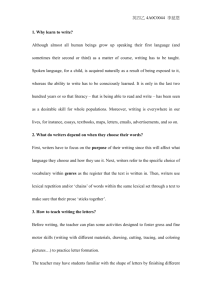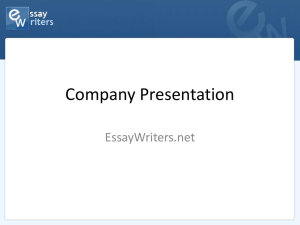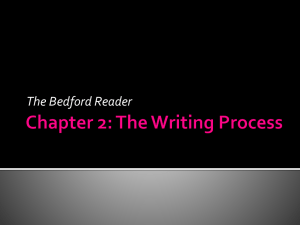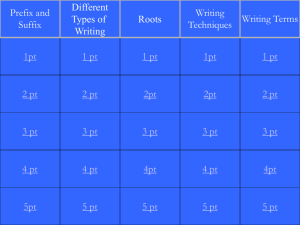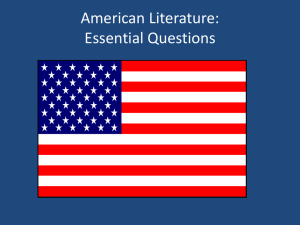English 2300.40
advertisement
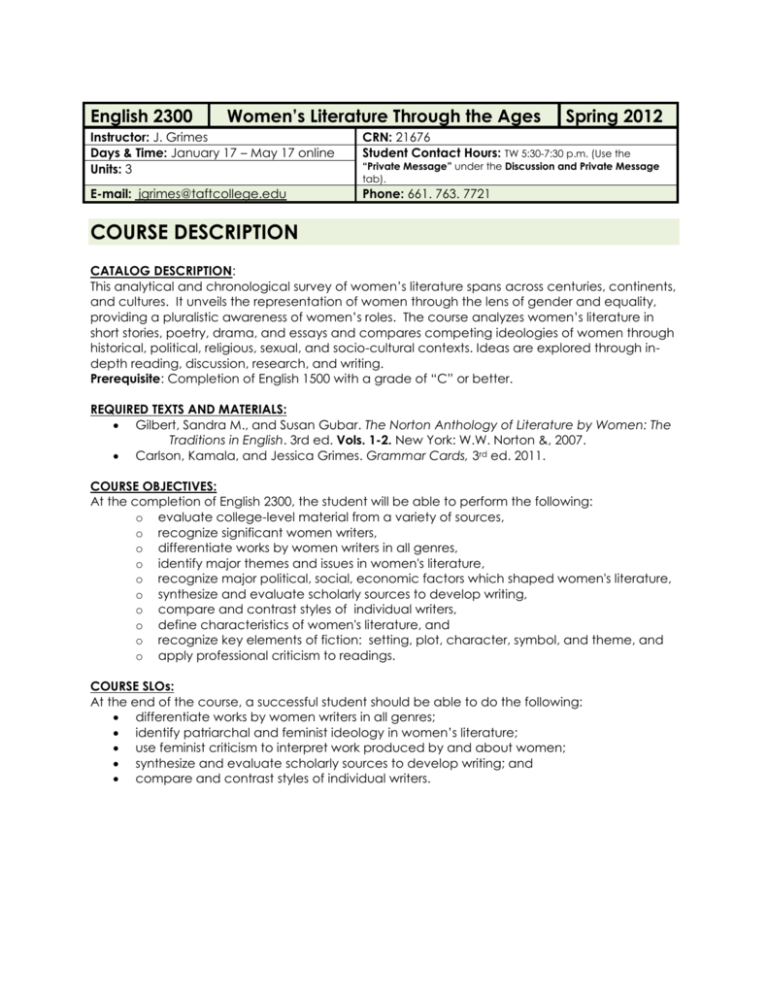
English 2300 Women’s Literature Through the Ages Spring 2012 Instructor: J. Grimes Days & Time: January 17 – May 17 online Units: 3 CRN: 21676 Student Contact Hours: TW 5:30-7:30 p.m. (Use the E-mail: jgrimes@taftcollege.edu Phone: 661. 763. 7721 “Private Message” under the Discussion and Private Message tab). COURSE DESCRIPTION CATALOG DESCRIPTION: This analytical and chronological survey of women’s literature spans across centuries, continents, and cultures. It unveils the representation of women through the lens of gender and equality, providing a pluralistic awareness of women’s roles. The course analyzes women’s literature in short stories, poetry, drama, and essays and compares competing ideologies of women through historical, political, religious, sexual, and socio-cultural contexts. Ideas are explored through indepth reading, discussion, research, and writing. Prerequisite: Completion of English 1500 with a grade of “C” or better. REQUIRED TEXTS AND MATERIALS: Gilbert, Sandra M., and Susan Gubar. The Norton Anthology of Literature by Women: The Traditions in English. 3rd ed. Vols. 1-2. New York: W.W. Norton &, 2007. Carlson, Kamala, and Jessica Grimes. Grammar Cards, 3rd ed. 2011. COURSE OBJECTIVES: At the completion of English 2300, the student will be able to perform the following: o evaluate college-level material from a variety of sources, o recognize significant women writers, o differentiate works by women writers in all genres, o identify major themes and issues in women's literature, o recognize major political, social, economic factors which shaped women's literature, o synthesize and evaluate scholarly sources to develop writing, o compare and contrast styles of individual writers, o define characteristics of women's literature, and o recognize key elements of fiction: setting, plot, character, symbol, and theme, and o apply professional criticism to readings. COURSE SLOs: At the end of the course, a successful student should be able to do the following: differentiate works by women writers in all genres; identify patriarchal and feminist ideology in women’s literature; use feminist criticism to interpret work produced by and about women; synthesize and evaluate scholarly sources to develop writing; and compare and contrast styles of individual writers. COURSE POLICIES: Plagiarism completely undermines the learning process. Taft College defines plagiarism as “any illegitimate act by any student, such as plagiarism or falsifying documents that would gain that student an advantage in grading, graduating from the college, or qualifying for entrance into any academic program” (Student Handbook 125). Any form of cheating, whether it is appropriating someone’s work or allowing others to use your work, is not acceptable. A student will receive a zero for the assignment, and other disciplinary measures may be taken depending on the severity of the offense. Attendance Policy: Since this is a distance-learning course, attendance is determined by the coursework you submit. If the first assignment is not submitted by the submission deadline posted, the assumption will be made that you do not wish to remain in the course, and you will be dropped from the class. After that date, you are responsible for dropping yourself from the course unless the deadline for dropping with a "W" has passed. Assignments and Tests: Most assignments and quiz deadlines are consistent from week to week and are due by 11:59 on Sunday night. Note all dates and times. Since late work is not accepted, being on time with your assignments and following directions are vital to your grade. If any questions or concerns arise, contact me immediately. You can contact me through private message. A response can be expected within a day or two at the most. Assignments are also graded within a week of submission. Late Work: Since work will be turned in weekly, in some cases biweekly, assignments must be turned in on time to receive full credit—without exception; therefore late work is not accepted. Grading Policy: Essays 47.5% (500 points), Essay 1-75, Essay 2-100, Research Paper - 300 Reading Questions (weekly) 15% (150 points) Discussion Questions (weekly) 75% (75 points) Quizzes (biweekly) 10% (100 points) Midterm 10% (100 points) Final Exam 10% (100 points) Etudes Information: This course is managed by the ETUDES course management system. If this is your first online course, please be patient. Read all sections listed in the Resources section. Read each screen as it comes up. Each day, before beginning an assignment, check for messages in the Announcements area. All assignments, quizzes, exams, and discussions will take place through Etudes. Etudes works well with most browsers, but Firefox (updated) has been more consistent in allowing students to download handouts. If any technical difficulty occurs, feel free to contact the Help Desk staff or me. 2 Please notice the menu bar on the left side of the Etudes screen. The following should be seen: Home, Schedule, Announcements, Syllabus, Modules, Assignments, Tests and Surveys, Discussion and Private Messages, Chat Room, Resources, Gradebook, and Help. Home link is where you will enter each time you log in. If you are enrolled in multiple classes, you will be able to link to each course by clicking on the class title listed on the tool bar at the top of your screen. Course Map provides an overview of the course: the syllabus, modules, discussions, assignments, tests, and surveys. Syllabus is where you will find the class syllabus, which is the document you are now reading. This provides you with an overview of the class, policy, procedures, and due dates . Announcements is where you will find any announcements that are posted throughout the course. Announcements may also be viewed in the Home area displayed when you first log into the class. Modules will guide you through this course. You will find chapter themes and key vocabulary from the readings in this area. When going to the Module area, click on the weekly Module title, read through the information given, then click the Next link at the bottom of the screen. Be sure to read through all information because sometimes pertinent information and tips will be posted. Assignments, Tests, and Surveys is the area in which you will find your class assignments. All assignments must be submitted in this area by the due dates listed. Read the directions carefully and watch the deadlines closely; if you miss a deadline, you WILL NOT BE ALLOWED TO MAKE-UP THE ASSIGNMENT. Once an assignment or quiz has been submitted, it cannot be retaken. Discussion and Private Messages area is where you will be participating in weekly class discussions. Chat Room is an area in which you can “chat” with others in the class. We may also join in on the conversation. Resources is a place where important documents will be kept for your use. Be sure to let us know if you would like to see additional information. Feel free to print anything you need. Gradebook is the area where grades for all assignments, discussions, quizzes, and exams will be located. Statement on Disabilities: Students with disabilities who believe they may need accommodations in the class are encouraged to contact Supportive Services at 763. 7841 or 763. 7927, as soon as possible to better ensure such accommodations are implemented in a timely fashion. 3 Learning Outcomes Differentiate works by women writers in all genres Identify patriarchal and feminist ideology in women’s literature Compare and contrast styles of individual writers Differentiate works by women writers in all genres Identify patriarchal and feminist ideology in women’s literature Compare and contrast styles of individual writers Differentiate works by women writers in all genres Identify patriarchal and feminist ideology in women’s literature Compare and contrast styles of individual writers Synthesize and evaluate scholarly sources to develop writing Use feminist criticism to interpret work produced by and about women Differentiate works by women writers in all genres Identify patriarchal and feminist ideology in women’s literature Compare and contrast styles of individual writers WEEK 1 Friday January 20 WEEK 2 Friday January 27 WEEK 3 Friday February 3 WEEK 4 Thursday February 10 WEEK 5 Friday February 16 WEEK 6 ASSIGNMENTS Julian of Norwich From A Book of Showings to the Anchoress Julian of Norwich 37-44 Margery Kempe From The Book of Margery Kempe 45-59 Aemelia Lanyer “Eve’s Apology in Defense of Women” 82, 85-87 Queen Elizabeth I “The Doubt of Future Foes”, “Ah Silly Pug, Wert Thou So Sore Afraid”, On Monsieur’s Departure”, “Speech to the Troops at Tilbury” 65-68 Elizabeth Cary From The Tragedy of Mariam, the Faire Queene of Jewry” 96-100 Mary Wroth “Song”, “Song 74”, From A Crown of Sonnets Dedicated to Love 77, “96”, 101-102, 106,108 Quiz 1 Anne Bradstreet The Prologue”, “In Honor of That High and Mighty Princess Queen Elizabeth of Happy Memory”, “The Author to Her Book”, “To My Dear and Loving Husband”, “A Letter to Her Husband…”, “In Reference to Her Children”, “In Memory of My Dear Grandchild…” 144-156 Katherine Philips “Friendship’s Mystery”, “To Mrs. M.A.”, “On the Death”, “To Sir Amorous La Fool”, “A Married State” 169-174 Aphra Behn Oroonoko 178-9, 186-231 Lady Mary Chudleigh From The Ladies Defense: Or, a Dialogue between Sir John Brute, Sir William Loveall, Melissa, and a Parson 231-233 ESSAY 1 DUE, Quiz 2 Mary Astell From A Serious Proposal to the Ladies 261-266 Lady Mary Wortley Montugu “The Reasons That Induced Dr. Swift to Write a Poem Called the Lady’s Dressing Room” 266-7, 273-275 *Jonathon Swift’s “The Lady’s Dressing Room” (Internet) Anne Ingram, Viscountess Irwin “An Epistle to Mr. Pope” 296-299 Alexander Pope “Epistle to a Lady” (Internet) Differentiate works by women writers in all genres Identify patriarchal and feminist ideology in women’s literature Compare and contrast styles of individual writers Differentiate works by women writers in all genres Identify patriarchal and feminist ideology in women’s literature Compare and contrast styles of individual writers Synthesize and evaluate scholarly sources to develop writing Differentiate works by women writers in all genres Differentiate works by women writers in all genres Identify patriarchal and feminist ideology in women’s literature Compare and contrast styles of individual writers Differentiate works by women writers in all genres Identify patriarchal and feminist ideology in women’s literature Compare and contrast styles of individual writers Friday February 24 WEEK 7 Friday March 2 WEEK 8 Friday March 9 WEEK 9 Friday March 16 WEEK 10 Friday March 23 Anna Letita Barbauld “The Rights of Woman”, “Epistle to William Wilberforce…” 309, 312-315 Abigail Adams Letters to John Adams 315-321 Judith Sargent Murray “On the Equality of the Sexes” 336-345 Phillis Wheatley “Letter Sent by the Author’s Master”, “On Being Brought from Africa to America” 358359 Quiz 3 Mary Wollstonecraft From A Vindication of the Rights of Woman 370-390 Mary Shelley “The Mortal Immortal” 493-6, 500-509 Sojourner Truth “Ain’t I a Woman?” and “What Time of Night It Is” 509-513 Quiz 4 Letitia Elizabeth Landon “The Marriage Vow” 520 Elizabeth Barrett Browning “The Cry of the Children”, “The Runaway Slave at Pilgrim’s Point”, From Sonnets from the Portuguese, “A Curse for a Nation” 521-523, 527-531, 533-541, 551-554 Harriet Jacobs From Incidents in the Life of a Slave Girl 618-629 MIDTERM Elizabeth Cady Stanton From Address to the New York State Legislature, 1860 630-631 George Eliot “Silly Novels by Lady Novelists” 975-986 Emily Dickinson Poems 205, 260, 336, 340, 353, 360, 372, 382, 407, 409, 479, 590, 620, 764, 788, 1263, 1470, 1715, 1734 Emily Brontë “Tell me, tell me smiling child,” “I am the only being whose doom,” “Riches I hold in light esteem,” “Aye, there it is! It wakes to-night,” “Ah! Why, because the dazzling sun,” “No coward soul is mine” 962, 966-967, 970-971, 973-974 Quiz 5 Christina Rossetti “Song”, “The World”, “Dead before Death”, , “A Triad”, “Goblin Market” 1076-1079, 1081, 1083, 1083-1100 Emma Lazarus “In the Jewish Synagogue at Newport”, “1492”, “The New Ezekiel”, “The New Colossus”, “Venus of the Louvre” 1237-1241 Henry Wadsworth Longfellow’s “The Jewish Cemetery at Newport” (Internet) Sarah Orne Jewett “The Town Poor” 1242-1251 Quiz 6 5 Differentiate works by women writers in all genres Identify patriarchal and feminist ideology in women’s literature Compare and contrast styles of individual writers WEEK 11 Friday March 30 Olive Schreiner From Woman and Labor 1357-1361 Charlotte Perkins Gilman “She Walketh Veiled and Sleeping”, “The Mother’s Charge”, and “The Yellow Wallpaper”, “Why I Wrote The Yellow Wallpaper?” 1388-1404 Mary Elizabeth Coleridge “A Clever Woman”, “The Other Side of a Mirror”, “The White Women”, and “Marriage” 1409-1414 Quiz 7 SPRING BREAK APRIL 2-6 Synthesize and evaluate scholarly sources to develop writing Use feminist criticism to interpret work produced by and about women Differentiate works by women writers in all genres Identify patriarchal and feminist ideology in women’s literature Compare and contrast styles of individual writers Identify patriarchal and feminist ideology in women’s literature Identify patriarchal and feminist ideology in women’s literature Identify patriarchal and feminist ideology in women’s literature WEEK 12 Friday April 13 WEEK 13 Friday April 20 Virginia Woolf “A Woman’s College from Outside” and “A Room of One’s Own” (“Shakespeare’s Sister”, “Professions for Women” 247 212-216, 231-233, 237-247 H.D. Doolittle “Orchard”, “Oread”, “Sea Poppies”, “Garden”, “Eurydice”, Fragment Thirty-Six”, and “Helen” 280-291 Zora Neale Hurston “Sweat” and “How It Feels to Be Colored Me” 347-360 ESSAY 2 DUE, Quiz 8 Toni Morrison “Recitatif” 994-1009 Joyce Carol Oates “Where Are You Going, Where Have You Been?” 1191-1203 Margaret Atwood “Rape Fantasies” and “There Was Once” 1203-1204, 1210-1219 WEEK 14 Friday April 27 Charlotte Brontë Jane Eyre 633-734 (author’s biography plus chapter I-XIV), Quiz 9 WEEK 15 Monday May 4 Charlotte Brontë Jane Eyre 734-831 (chapters XV-XXV) WEEK 16 Monday May 9 Charlotte Brontë Jane Eyre 831-958 (chapters XXV-XXXVIII), Quiz 10 WEEK 17 6 Synthesize and evaluate scholarly sources to develop writing Differentiate works by women writers in all genres Wednesday May 16 RESEARCH PAPER DUE and FINAL EXAM 7


